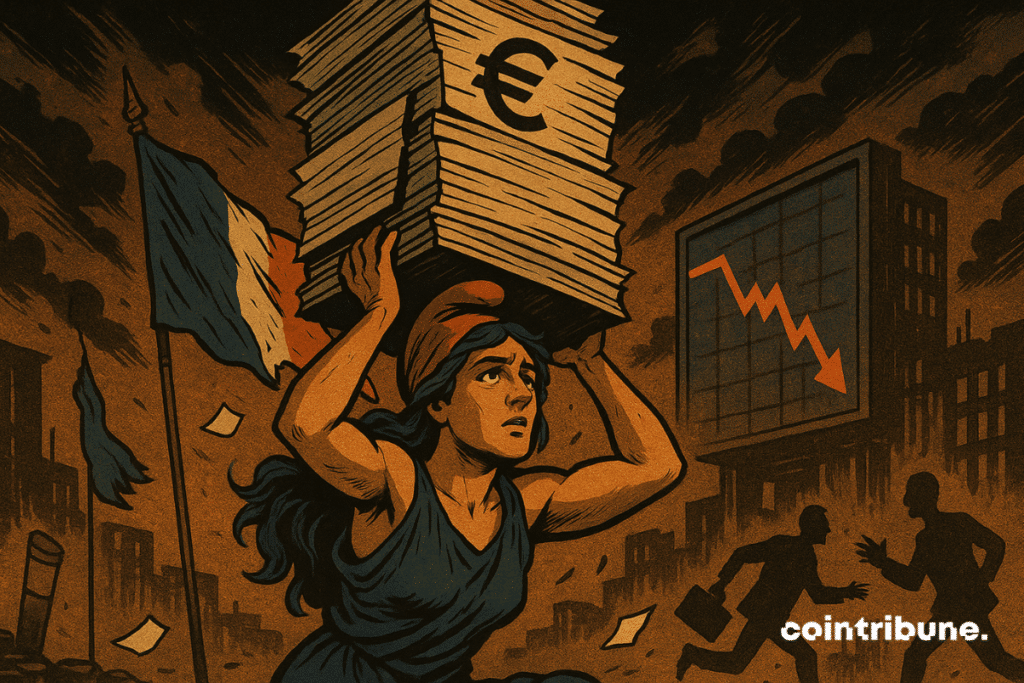French Debt Costs Rise Above Italy’s For First Time Since 2005
Since the beginning of July, investors have been lending to Italy at a rate lower than that required for France. Indeed, the curve has inverted for the first time since 2005, weakening Paris’s position in the hierarchy of sovereign risk in the eurozone. Yet, France retains a better rating. This paradox reflects a perceptible reality: the markets are doubtful. And in this hesitation, alternative assets are gaining ground.

In brief
- For the first time since 2005, the 5-year interest rate on French debt exceeds that of Italy.
- This symbolic inversion marks a sign of market distrust towards the French signature.
- Despite a better credit rating (AA-), France borrows at a higher cost than countries historically considered riskier.
- This situation is explained by a very high level of public spending and an unconvincing budgetary trajectory.
A signal of distrust in the bond markets
While the interest on French debt is exploding, last Friday a symbolic threshold was crossed on the European debt markets. For the first time since 2005, the interest rate demanded by investors to lend to France over five years exceeded that granted to Italy.
“France borrows at higher rates than Italy”, specified Éric Lombard, Minister of the Economy. Indeed, the rate on the French five-year bond reached 2.67 %, compared to 2.65 % for its Italian equivalent. This reversal, although temporary, constitutes a strong signal sent by the markets regarding the perception of sovereign risk in the eurozone.
Such a movement is not isolated. It fits into an overall dynamic of risk premium adjustment in Western Europe. While French interest rates have remained almost unchanged since early 2023, those of other countries with more disciplined budgetary trajectories have declined. This is illustrated by the evolution of five-year rates:
- France : 2.54 % at the beginning of 2023, and 2.67 % today ;
- Italy : 3.62 % at the beginning of 2023, 2.67 % today (significant decrease);
- Spain (with an A rating by S&P) : 2.94 % at the beginning of 2023, and 2.42 % today ;
- Portugal (also rated A) : 2.75 % at the beginning of 2023, then 2.36 % today.
This picture is all the more worrying since France remains theoretically better rated by agencies (AA-). Yet in practice, investors demand higher compensation to hold its debt. This discrepancy between rating and perception reflects a progressive and tangible loss of credit in the markets.
A deterioration fueled by budget fundamentals
Beyond the symbolic shock on rates, this situation reflects growing concern related to the management of French public finances. “Public spending represents 57 % of GDP, ten points higher than the average of European countries”, emphasized Éric Lombard in his warning.
This well-known but rarely translated structural gap into credit cost until now seems to weigh increasingly on the perception of French debt. Unlike its southern neighbors, who have multiplied budgetary consolidation efforts since the sovereign debt crisis, Paris appears to lag behind, with few significant structural reforms in recent years.
This difficult budgetary trajectory, combined with uncertain political context and sluggish growth, contributes to increasing the risk premium demanded by investors. The government, engaged in savings plans discussed at Bercy for the 2026 budget, is now under pressure to avoid a runaway increase in borrowing costs.
However, these measures remain vague and struggle to convince the markets. The mere fact that historically more fragile states, such as Portugal or Spain, can benefit from better access to financing illustrates a reversal of dynamics that rating agencies and major asset management firms will closely monitor.
If this trend were to continue, the consequences could go far beyond the cost of sovereign debt. It would call into question the perceived stability of the French fiscal framework, which could impact medium-term foreign investment, local equity markets, and savers’ confidence.
In a climate where states’ credibility is challenged by rising rates and debt burden, certain monetary alternatives attract investors’ attention. Bitcoin, often described as a decentralized store of value, sees its legitimacy strengthen as sovereign debts create distrust.
For observers, this growing distrust of classic sovereign assets could also fuel attraction to alternatives related to decentralized finance. France thus finds itself in a delicate position: it can either restore trust through political and economic resurgence, or risk a lasting downgrade within the European financial order.
Maximize your Cointribune experience with our "Read to Earn" program! For every article you read, earn points and access exclusive rewards. Sign up now and start earning benefits.
Diplômé de Sciences Po Toulouse et titulaire d'une certification consultant blockchain délivrée par Alyra, j'ai rejoint l'aventure Cointribune en 2019. Convaincu du potentiel de la blockchain pour transformer de nombreux secteurs de l'économie, j'ai pris l'engagement de sensibiliser et d'informer le grand public sur cet écosystème en constante évolution. Mon objectif est de permettre à chacun de mieux comprendre la blockchain et de saisir les opportunités qu'elle offre. Je m'efforce chaque jour de fournir une analyse objective de l'actualité, de décrypter les tendances du marché, de relayer les dernières innovations technologiques et de mettre en perspective les enjeux économiques et sociétaux de cette révolution en marche.
The views, thoughts, and opinions expressed in this article belong solely to the author, and should not be taken as investment advice. Do your own research before taking any investment decisions.